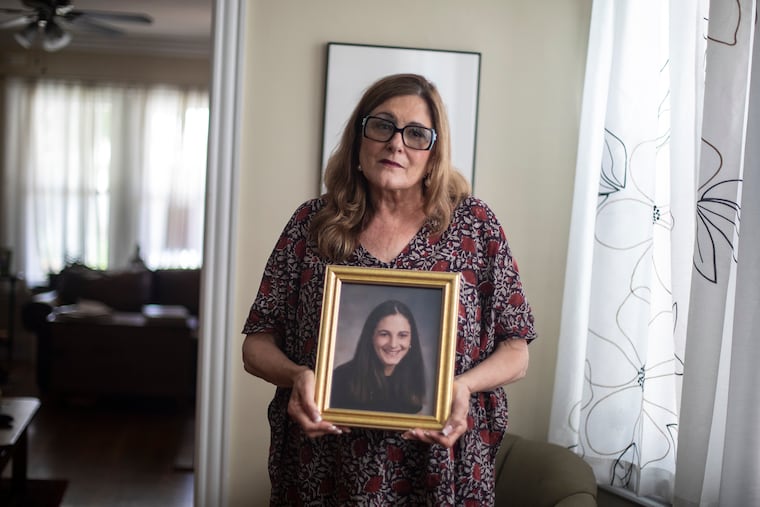A Philly mother’s searing memoir on her daughter’s overdose condemns the treatment system that failed her | Mike Newall
Elise Schiller's story is heartrending depiction of a family’s loss and a daughter’s struggle. It's also an indictment of the drug treatment system that compounded it.

After Elise Schiller’s daughter died of an overdose at 33 — in a treatment center thousands of miles from their Germantown home — she began the unthinkable task of sorting through the journals.
The diaries Giana Natali kept as a little girl. The treatment journals she wrote in rehab after rehab, suffering from an opioid addiction. And even the medical records that were vague, and sometimes incorrect, and heartbreaking in how little anyone did to really treat her.
It infuriated Elise to realize just how outdated so much of the treatment was in 2014. As if it was a waste of time, she thought.
The retired educator began to write.
The result, a memoir called Even If Your Heart Would Listen: Losing My Daughter to Heroin, details a family’s journey through addiction and grief. The power of Elise’s book, to be published later this summer, lies not only in its heartrending depiction of a family’s loss and a daughter’s struggle, but in its condemnation of the treatment system that compounded it.
Parade magazine last week listed it among the 10 most-inspiring books written by women in 2019.
It’s a memoir of what-ifs, the kind of what-ifs all families who lose a child to addiction, my own family included, torment themselves with. But the biggest hypothetical is what would have happened if Giana had been treated by a system that recognized her addiction as a disease that needed medicine and modern treatment, not tough love.
“I don’t know if this could have saved her,” Elise writes. “But I wouldn’t feel the regrets I have now that I waited too long to understand and that I believed ‘experts’ who, it turns out, were part of a broken, outdated, ineffective response.”
Giana had been a Division I swimmer at Rutgers University who suffered from depression, anxiety, and anorexia, which led her parents to seek help. She was well again, and working as a veterinary nurse — a perfect job for a dog lover — when someone at her gym introduced her to Nubain, an injectable synthetic opioid. That eventually led to heroin, and a string of rehabs in Pennsylvania and then out of state. She overdosed in a treatment center in Colorado, after spending the day with her sister.
Elise wrote the book in part because she wanted people to know who her daughter was beyond her addiction – the lanky little girl with the heart of a lion, double-jointed in both elbows and knees, who was instantly recognizable in a pool for the way her arms rose out of the water at awkward angles. She’d grow into a champion swimmer — and she shared her mother’s love of animals and reading, and her introspection, too. Her mother didn’t realize the full extent of Giana’s depression until reading her journals.
But Elise also wants to help other families advocate for themselves. Ask the questions she wished she had asked of Giana’s caregivers.
The book, in discussing Giana’s treatment, can be maddening. The treatment centers her daughter cycled through were still treating addiction like a moral failing, rather than a chronic condition. Giana was kicked out of treatment for relapsing, even though that’s part of many people’s recovery. Medication-assisted treatment was barely available. It can feel, reading episode after episode of frustrating lapses in care, that even as recently as five years ago, our system was treating a burgeoning public health epidemic with the equivalent of an aspirin.
Things have changed, a bit, since Giana’s death. It’s easier to get medication-assisted treatment now, even though some of the centers Giana cycled through still don’t offer the treatment that’s considered the gold standard for opioid addiction. Still, Elise, who sat on the city’s opioid task force in 2016, knows there’s more to be done — like opening a supervised injection site in Philadelphia.
It’s a position she can hardly imagine herself taking seven years before, when she first learned Giana had become addicted. “If it had been described to me then, I would have thought you had three heads,” she said with a laugh. But it’s one that she now fiercely advocates for. She and her ex-husband, Louis Natali, told Giana’s story this week in a friend-of-the-court brief supporting Safehouse, the Philadelphia nonprofit working to open a site.
“Giana’s death changed my family’s life forever,” she said. “We should do everything we can to prevent what happened to Giana from happening to anyone else.”
She hopes Giana’s story — and now her own — will help achieve that.